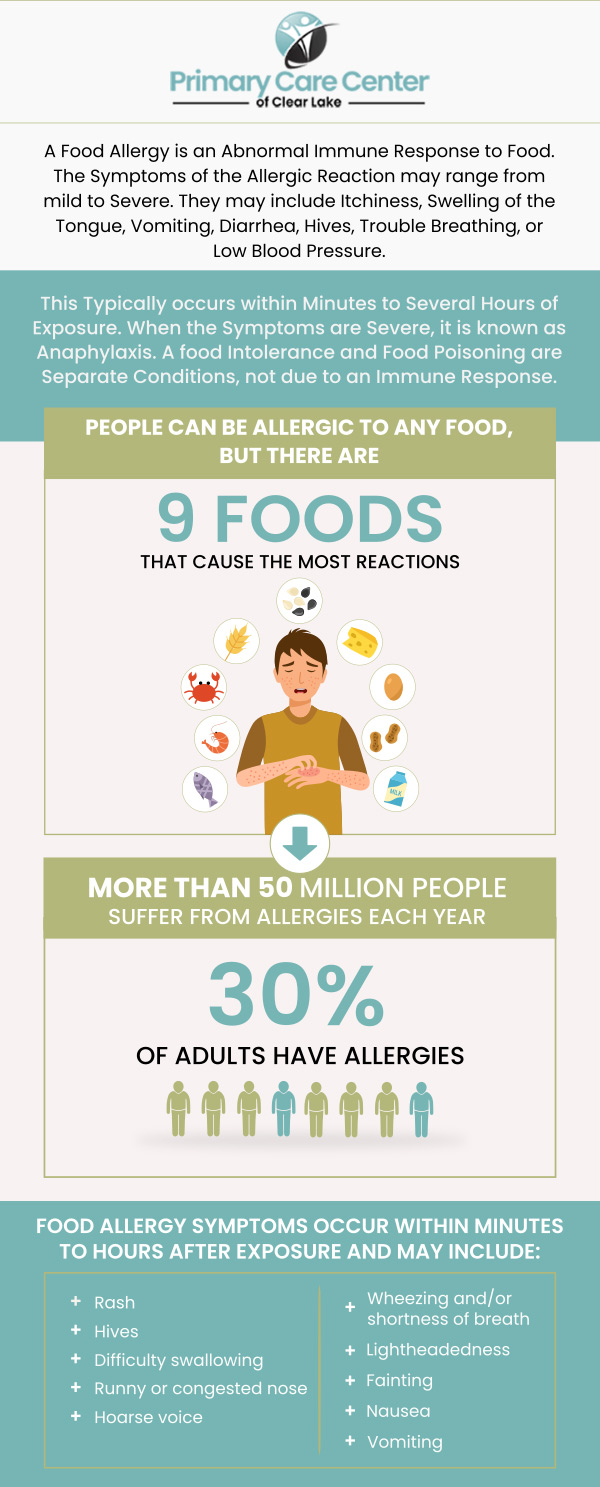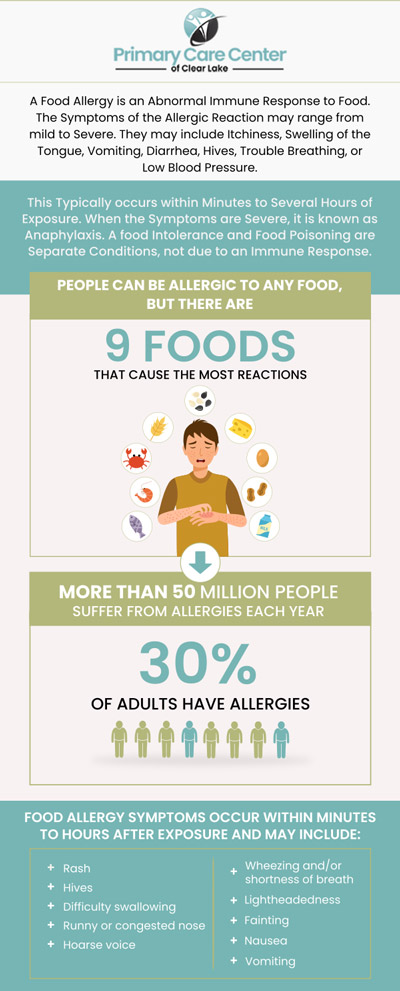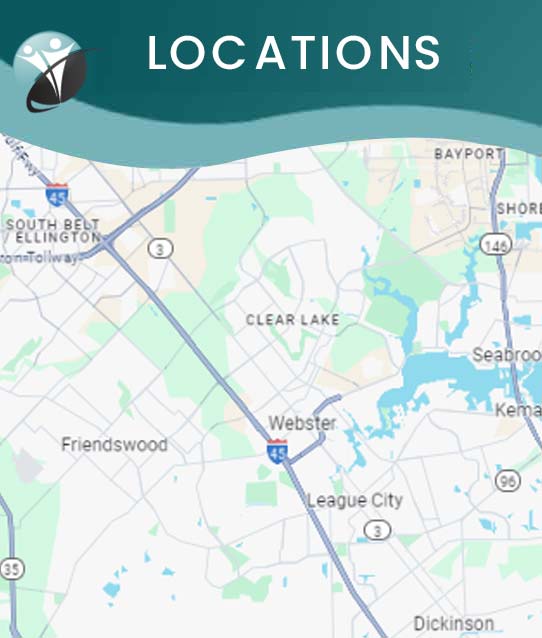Food Allergy Treatment Specialist in Webster TX
Food allergy testing is crucial for identifying the specific foods that cause allergic reactions, which can vary from mild to severe. By identifying these allergens, individuals can make informed dietary choices, avoid potentially life-threatening reactions, and enhance their overall health. Early detection is important as it helps prevent complications and ensures a safer, more manageable lifestyle for those with food allergies. Dr. Smriti Choudhary, M.D., and Dr. Niraj Choudhary, M.D can help your family with everything from diagnosis to treatment to long-term care. For more information, please contact us or schedule an appointment online. We have convenient locations to serve you in Webster and Pasadena, TX.




Table of Contents:
What are the causes of food allergies?
How can food allergies be cured?
When should you see a doctor for a food allergy?
What are the different signs of severe food allergies?
Food allergies are a type of hypersensitivity reaction, or an overreaction of the immune system, to certain foods. The most common food allergies are to dairy and eggs, though people can also develop allergies to peanuts, tree nuts, fish, wheat, and other foods. The body’s response can include everything from mild symptoms such as a rash to life-threatening emergencies such as anaphylactic shock. Food allergies can be mild or severe and can cause symptoms such as itching, hives, nausea, vomiting, diarrhea, and swelling.
Although many risk factors for food allergies have been identified and are being studied, the cause of food allergies is still largely a mystery. Risk factors for food allergies include:
• Age — One factor in the development of food allergies is age; younger children are more at risk for developing food allergies than adults or the elderly.
• Genetics — People are more likely to develop food allergies if a close relative, such as a parent, also has food allergies.
• Gender — Women (4.2 percent) are more likely to have food allergies than men (2.9 percent), except for peanut allergies, which are slightly more common in men.
The science behind what causes food allergies, how they are treated, and the prospect for people living with them is not well understood. Currently, there are no known cures for food allergies, but there are ways to reduce sensitivities to foods, such as immunotherapy. Immunotherapy is an effective treatment for certain allergies and may also be efficacious for food allergies. Two practices to reduce symptoms for people living with food allergies include awareness (of the ingredients and foods) and reduction of stress, as stress hinders digestion and can induce physical adverse reactions when levels are too high, including the disruption of psychological processes.
Food allergies can be hard to live with, and it can be difficult to pinpoint which foods are causing a reaction, especially in people with varied diets. In some cases, people with food allergies can live fulfilling and symptom-free lives by avoiding foods that cause allergies, but that is easier said than done. It is important to see an allergy specialist for a food allergy when:
• Allergic symptoms last for more than three months, including runny or stuffy nose, cough or watery eyes
• Symptoms make it hard to work
• Allergic symptoms interfere with sleep
• Over-the-counter drugs do not provide enough relief
• Frequent sinusitis, headaches, or other symptoms occur
• Allergies cause loud snoring
It is important to note that people with other health problems such as heart disease, high blood pressure, thyroid disease, glaucoma, diabetes, liver disease, enlarged prostate, or kidney disease, may not be able to safely treat allergies with over-the-counter drugs as interaction may occur between medicines used to treat these conditions, or the side effects of allergy drugs may cause complications with any of these conditions.
When it comes to allergies of any type, including food allergies, there are a large number of mild or moderate symptoms, from excess mucus production to skin irritation to eye discomfort. However, in terms of severe allergic reactions, regardless of the type of allergy or cause, there are only a few symptoms, which include swelling (edema) and breathing difficulties (dyspnea). Both of these are common in anaphylaxis, which is a life-threatening allergic reaction that causes the airways to swell and close up, leading to labored breathing. However, another sign of a severe food allergy is a large or widespread rash that covers the majority of the skin’s surface.
If you suspect you have a food allergy, come to Primary Care Center for professional diagnosis and treatment. Contact us today or book an appointment with our food allergy treatment specialist. We are conveniently located at 13920 Osprey Ct, Suite C, Webster, TX 77598. We serve patients from Webster TX, Bacliff TX, Dickinson TX, Seabrook TX, League City TX, Clear Lake City TX, and surrounding areas.
Check Out Our 5 Star Reviews


Additional Services We Offer
• 2D ECHO
• ABI Testing
• Obesity Medicine
• Alzheimer’s Disease
• Anxiety Disorder
• Aortic Aneurysm Screening
• Arthritis
• Asthma
• Body Composition Testing
• Cancer Screening
• Carotid Doppler
• Chronic Condition Management
• Chronic Kidney Disease
• Chronic Obstructive Pulmonary Disease
• Congestive Heart Failure
• COPD & Asthma
• Coronary Heart Disease
• COVID-19 Testing
• Dementia Screening
• Depression
• Diabetes Management
• EKG
• Food Allergies
• Food Sensitivity
• Geriatric Care
• Hypertension
• Outdoor Allergies
• Parkinson’s Disease
• Primary Care
• Resting Metabolic Rate Testing
• Thyroid Scan
• Wellness Exams for Men
• Wellness Exams for Women
• Ozempic
• Integrative Medical Weight Loss
• Men’s Health
• Testosterone Replacement Therapy
• Erectile Dysfunction
• Testosterone Gel and Injections
• Women’s Health
• Menopause
• PCOS
• Hormone Replacement Therapy
• Individual Nutritional and Lifestyle Counselling
• Indoor Allergies
• Internal Medicine
• Lipid Disorders
• Medical Weight-Loss
• Osteoporosis

Additional Services We Offer
• 2D ECHO
• ABI Testing
• Obesity Medicine
• Alzheimer’s Disease
• Anxiety Disorder
• Aortic Aneurysm Screening
• Arthritis
• Asthma
• Body Composition Testing
• Cancer Screening
• Carotid Doppler
• Chronic Condition Management
• Chronic Kidney Disease
• Chronic Obstructive Pulmonary Disease
• Congestive Heart Failure
• COPD & Asthma
• Coronary Heart Disease
• COVID-19 Testing
• Dementia Screening
• Depression
• Diabetes Management
• EKG
• Food Allergies
• Food Sensitivity
• Geriatric Care
• Hypertension
• Outdoor Allergies
• Parkinson’s Disease
• Primary Care
• Resting Metabolic Rate Testing
• Thyroid Scan
• Wellness Exams for Men
• Wellness Exams for Women
• Ozempic
• Integrative Medical Weight Loss
• Men’s Health
• Testosterone Replacement Therapy
• Erectile Dysfunction
• Testosterone Gel and Injections
• Women’s Health
• Menopause
• PCOS
• Hormone Replacement Therapy
• Individual Nutritional and Lifestyle Counselling
• Indoor Allergies
• Internal Medicine
• Lipid Disorders
• Medical Weight-Loss
• Osteoporosis





